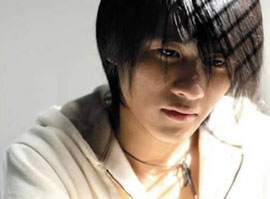韩寒败诉 拒绝退还40万
[ 2007-01-25 10:49 ]
|
进入2007年,引人注目的80后作家韩寒麻烦连连,这些在他的博客中都有所反映。
先是博客文章被当语文挑错试题,继之新书《毒3》出版未成反生纠纷。据了解,韩寒被北京汉图文化传播有限公司指责没能如约交出稿件,稿件字数不符合要求,同时还有东拼西凑嫌疑。汉图指出,《毒3》内容多来自韩寒博客文字,没有商业价值。日前,北京汉图出版公司向上海一中院申请强制执行“韩寒退钱40万元”这一司法裁决,而韩寒则委托律师在执行期限的最后一天提交了不予执行的申请书,拒付违约金。
|
|
 |
|
Edgy Chinese
author Han Han is fighting a court order to repay an advance for a
rejected book, newspapers said Wednesday, in a case that questions whether
writings posted on a personal Web log can legitimately be regarded as
literature. [baidu.com] |
Publishing house Hantu
claimed that Han's text for "Poison 3" fell short of the agreed length and
mainly contained freely downloadable writings from his blog that had no
commercial value.
Shanghai's No. 1 Intermediate Court this month upheld an arbitration
committee's ruling that Han pay the publishing company a settlement of
US$51,850.
"These scraps don't constitute a text worth almost US$115,000," Hantu's
lawyer Huang Xiao was quoted as saying by the Shanghai newspaper Youth Daily,
referring to the total amount Han was due to receive for the book.
Han, whose lawyer filed an appeal Tuesday to overturn the Shanghai court's
decision, said his agreement with Hantu had specifically called for a
compilation of his blog writings filled out with additional commentaries and
drawings.
Han's blog comprises brief essays, diary entries, photos and
other snippets of information.
Such works deserved to be published because they had "never been put to
paper," Han was quoted as saying by the Youth Daily.
"However, the contract was extremely vague about the content and it's now
become a matter of them interpreting it however they like," Han said.
Hantu rejected the text when it was delivered last July and won a ruling from
a Beijing arbitration committee in December ordering Han to pay US$51,850 to
cover the advance, a penalty and
court costs.
When Han refused to pay, the publishers brought the case before the court in
Shanghai asking it to enforce the ruling. A statement on the court's Web site
said the ruling had been upheld and that Han was given a specific date by which
to pay or face confiscation of his
assets.
Hantu publishers had no listed phone number or Web site. Contact numbers for
Han and his lawyers have not been released, although postings on his
Chinese-language Web log said he believed he would win his appeal.
Han, 24, is among the stars of a loosely defined group of young authors
labeled the "post-80s" generation, known as much for his irreverent novels as
his outspoken personality. His volume of collected writings, "Five Years of Han
Han" has been translated into French, Korean and Japanese.
In recent years, Han has launched a second career as a semiprofessional race
car driver, causing many to question his commitment to the author's craft.
Last year, he engaged in a prolonged online spat with critic Bai Ye, who had
called Han and other post-80s writers hacks whose works had little to do with
real literature.
(Agencies)
Vocabulary:
Publishing
house:出版社
snippet:片断、零碎(信息)
advance:预付款
confiscation
of his assets:没收其个人财产
(英语点津陈蓓编辑) |